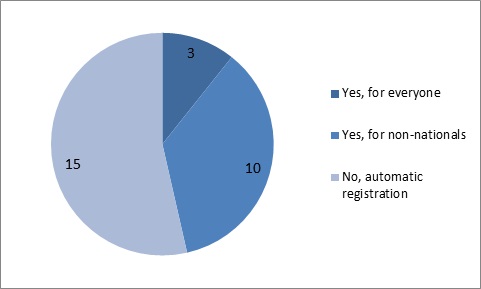Help us make the FRA website better for you!
Take part in a one-to-one session and help us improve the FRA website. It will take about 30 minutes of your time.
Is there a requirement under law to register to vote?
Some EU Member States require potential voters to register before they are able to vote. This requirement can apply either to all prospective voters, or only to certain groups such as non-citizens who are resident in the country at the time of an election. This second group is particularly important in the context of the EU as Article 20 (2) (b) of the TFEU allow all persons with EU citizenship “to vote and to stand as a candidate in elections to the European Parliament and in municipal elections in their Member State of residence, under the same conditions as the nationals of that state.” This is reiterated in articles 39 and 40 of the Charter. Again, Article 21 of the Charter underscores the obligation to ensure non-discrimination in all areas of EU action.
A requirement to register to vote can hinder the political participation of persons with disabilities if voting registration procedures are inaccessible. Burdens associated with inaccessible registration could also be seen as indirect discrimination on the grounds of disability if reasonable accommodations are not given. This is especially relevant if special registration as a person with a disability is required to be able to vote at an accessible polling station, use an alternative means of voting such as postal voting or a mobile ballot box, or to request support or assistance on polling day.
Is there a requirement under law to register to vote?

Source: FRA, 2014
In half (15) of EU Member States, there is automatic registration for all voters. However, several of these Member States have specific provisions in place which require people with disabilities who would like support or assistance to vote to request such reasonable accommodations well in advance of polling day. In Bulgaria, for example, people who cannot vote at their assigned polling station for reasons associated with a disability have to request permission for mobile voting 30 days prior to election day, while in Poland, voters with disabilities can change their place of voting to a more accessible polling station if they notify the authorities at least 14 days before the vote.
Ten Member States – Austria, Belgium, Croatia, Denmark, Greece, France, Italy, Luxembourg, Malta and Poland – require non-nationals to register to vote. This includes EU citizens who have exercised their right to free movement and who would like to vote in European Parliament or municipal elections in their Member State of residence. For example, in France non-nationals need to register to be included on a supplementary electoral roll (liste electorale complémentaire), whereas in Greece they must register to be added to the special voting registers of their place of residence. As with the group above, some Member States have additional registration requirements for persons with disabilities. Voters in Italy, for example, who would like to be accompanied to the polling station by a relative or another person must first register with the municipal electoral office as a person with a permanent disability.
Three EU Member States, Cyprus, Ireland and the United Kingdom, require all voters to register ahead of an election. In the UK new Individual Electoral Registration has recently been introduced, requiring an individual to register and provide further identification. This means that voters with disabilities who could previously vote by post or by proxy will need to re-register.